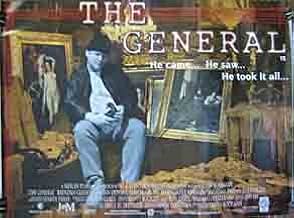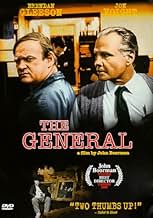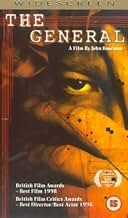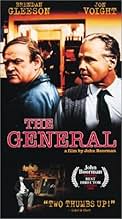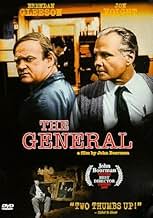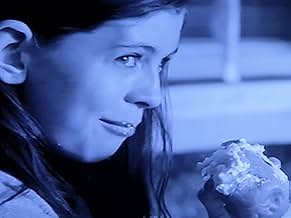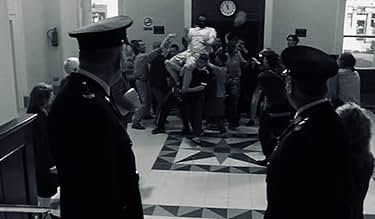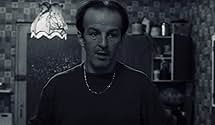IMDb-BEWERTUNG
7,2/10
9531
IHRE BEWERTUNG
Die wahre Geschichte des Dubliner Volkshelden und Verbrechers Martin Cahill, der mit seinem Team zwei gewagte Raubüberfälle in Irland verübt hat.Die wahre Geschichte des Dubliner Volkshelden und Verbrechers Martin Cahill, der mit seinem Team zwei gewagte Raubüberfälle in Irland verübt hat.Die wahre Geschichte des Dubliner Volkshelden und Verbrechers Martin Cahill, der mit seinem Team zwei gewagte Raubüberfälle in Irland verübt hat.
- Regie
- Drehbuch
- Hauptbesetzung
- Auszeichnungen
- 10 Gewinne & 14 Nominierungen insgesamt
Vinny Murphy
- Harry
- (as Vinnie Murphy)
Roxanna Nic Liam
- Orla
- (as Roxanna Williams)
Empfohlene Bewertungen
In terms of acting, direction and entertainment value, the general certainly delivers. Its is well paced, humorous and the performances of all the main actors, in particular Brendan Gleeson and Jon Voight, are excellent. I'm not sure why the film is shot in black and white, I don't think this adds particularly to the film.
My one reservation about the film is the portrayal of the main character, Martin Cahill, whom I think is overly glamorised. I remember before Cahills death his exploits as I saw them in the newspapers and television, and from the many stories which circulated around Dublin at that time of his criminal activity. This was no latter day Robin Hood. He was an unusually successful thief, no doubt, but with none of the charitable spirit. He was also extremely cruel, at one time breaking into the home of a social welfare officer and torturing him for hours simply because he had refused Cahill welfare payments.
I would recommend people to see this film, but at all times remember that the man it portrays was no one to be admired, but an example of the most vile thugs that Ireland has had the shame to produce in recent years. But then they say, "The devil has the best tales".
My one reservation about the film is the portrayal of the main character, Martin Cahill, whom I think is overly glamorised. I remember before Cahills death his exploits as I saw them in the newspapers and television, and from the many stories which circulated around Dublin at that time of his criminal activity. This was no latter day Robin Hood. He was an unusually successful thief, no doubt, but with none of the charitable spirit. He was also extremely cruel, at one time breaking into the home of a social welfare officer and torturing him for hours simply because he had refused Cahill welfare payments.
I would recommend people to see this film, but at all times remember that the man it portrays was no one to be admired, but an example of the most vile thugs that Ireland has had the shame to produce in recent years. But then they say, "The devil has the best tales".
If you're watching one of the Classic Warner Brothers Gangster movies on tv and someone asserts that "They don't make 'em like that anymore", here's a movie to prove them wrong. As real-life Dublin gangster Martin Cahill Irish actor Brendan Gleeson provides a criminal hero to compare with those played by Edward G. Robinson and Jimmy Cagney. Brutal and Compassionate by turns, Gleeson's Cahill eschews links to anything outside himself and his home and circle of acquaintances. Hating the state, he turns Ireland's liberal justice system upon itself; hating the media, he blocks his face from TV cameras. Ultimately, it's this status as an existential outsider that brigs about his tragic downfall, but along the way there are moments of incredible comedy as the Gardai, or Irish Police are made to look like bumbling Keysone cops. The monochrome cinematograhy gives an excellent verite effect and the supporting cast with Jon Voight and a host of Irish stalwarts, are superb.
John Boorman's 'The General' was always going to be a controversial movie and a tough sell for its filmmakers.
It's anti-hero, Martin Cahill was Ireland's most infamous criminal of recent times - so much so that there has been four screen depictions of him (Ken Stott in The Vicious Circle, Kevin Spacey in Ordinary Decent Criminal, Pete Postlethwaite in When The Sky Falls and Brendan Gleeson in The General).
He was guilty of some of the country's most outrageous crimes and capable of real brutality - most notably, injuring a forensic scientist in a car bomb and literally nailing one of his gang members to the floor.
Add into the mix the fact that the film has a largely Irish cast deploying thick Dublin accents and that Boorman chose to shoot it in black and white and you have a movie which wasn't exactly going to jump out at international and especially, US audiences demanding to be loved.
The result is perhaps Boorman's finest work, certainly on a par with the wonderful 'Hope and Glory'.
The film is also by a furlong the best of the four movies depicting Cahill's life.
This is in large part due to the brilliant performance of Irish actor, Brendan Gleeson in the central role.
The Irish Depardieu not only physically transforms himself into Cahill but captures the rebellious spirit, the intelligence and the charm.
It would have been easy to depict Cahill as a monster.
However, Gleeson and Boorman treat their audience with respect, building up a character with shades of darkness and light.
On one hand, viewers are given an appreciation of how "The General" was able to command the love of two sisters, his children and the adulation of his criminal associates.
However, Boorman's film is certainly no love letter to Cahill. We also see his sadistic side as in the bombing of the forensic scientist's car and crucifixion of one of his gang members, his lack of consideration and compassion for the 100 workers laid off at a storeroom he has robbed, his cold bargaining with the sexually abused daughter of one of his gang members.
The supporting cast also put in fine performances too.
Jon Voight not only masters the rural Irish brogue of the Garda (police) inspector bedevilled by Cahill but also the attitudes. It is a tough but ultimately sympathetic performance of a cop dragged unwillingly into the gutter.
Maria Doyle Kennedy and Angeline Ball give charming performances as the sisters who were also the women in Cahill's rather unorthodox life, with Ciaran Fitzgerald also making a sympathetic son.
Adrian Dunbar, Sean McGinley and Eanna MacLiam all put in spirited performances as members of Cahill's gang. McGinley, in particular, creates another memorably seedy performance as Gary.
Special mention should also go to Pat Laffan as a brutish Garda sergeant.
With it's cracking script, Richie Buckley's musical score and the black and white camerawork, 'The General' is easily up there with the best of modern movies made in Ireland (certainly, up there with Neil Jordan's 'The Butcher Boy' and Alan Parker's 'The Commitments').
It is a must see - a film which demands cult status.
It's anti-hero, Martin Cahill was Ireland's most infamous criminal of recent times - so much so that there has been four screen depictions of him (Ken Stott in The Vicious Circle, Kevin Spacey in Ordinary Decent Criminal, Pete Postlethwaite in When The Sky Falls and Brendan Gleeson in The General).
He was guilty of some of the country's most outrageous crimes and capable of real brutality - most notably, injuring a forensic scientist in a car bomb and literally nailing one of his gang members to the floor.
Add into the mix the fact that the film has a largely Irish cast deploying thick Dublin accents and that Boorman chose to shoot it in black and white and you have a movie which wasn't exactly going to jump out at international and especially, US audiences demanding to be loved.
The result is perhaps Boorman's finest work, certainly on a par with the wonderful 'Hope and Glory'.
The film is also by a furlong the best of the four movies depicting Cahill's life.
This is in large part due to the brilliant performance of Irish actor, Brendan Gleeson in the central role.
The Irish Depardieu not only physically transforms himself into Cahill but captures the rebellious spirit, the intelligence and the charm.
It would have been easy to depict Cahill as a monster.
However, Gleeson and Boorman treat their audience with respect, building up a character with shades of darkness and light.
On one hand, viewers are given an appreciation of how "The General" was able to command the love of two sisters, his children and the adulation of his criminal associates.
However, Boorman's film is certainly no love letter to Cahill. We also see his sadistic side as in the bombing of the forensic scientist's car and crucifixion of one of his gang members, his lack of consideration and compassion for the 100 workers laid off at a storeroom he has robbed, his cold bargaining with the sexually abused daughter of one of his gang members.
The supporting cast also put in fine performances too.
Jon Voight not only masters the rural Irish brogue of the Garda (police) inspector bedevilled by Cahill but also the attitudes. It is a tough but ultimately sympathetic performance of a cop dragged unwillingly into the gutter.
Maria Doyle Kennedy and Angeline Ball give charming performances as the sisters who were also the women in Cahill's rather unorthodox life, with Ciaran Fitzgerald also making a sympathetic son.
Adrian Dunbar, Sean McGinley and Eanna MacLiam all put in spirited performances as members of Cahill's gang. McGinley, in particular, creates another memorably seedy performance as Gary.
Special mention should also go to Pat Laffan as a brutish Garda sergeant.
With it's cracking script, Richie Buckley's musical score and the black and white camerawork, 'The General' is easily up there with the best of modern movies made in Ireland (certainly, up there with Neil Jordan's 'The Butcher Boy' and Alan Parker's 'The Commitments').
It is a must see - a film which demands cult status.
10ToldYaSo
In a small way, I'm almost glad that all films aren't as good as "The General". It's dripping with one of those intangible elements that seems to escape other films. Sheer quality craftsmanship and excellent storytelling.
There's a very rich quality to this film. What we see on screen merely scrapes the surface of a full history that is eluded to but not entirely exposed explicitly, which is what I think works best to keep interests up. Just brilliant film work in every regard makes this story come to life. Crime, ethics, political standpoints and complex relationships.
Martin Cahill, the film's central character, is the anti-hero thief, something of a modern day Robin Hood but much more visceral. I understand that John Boorman was allegedly one of Cahill's break-in victims. From what we see in the film, he remains constant to his own beliefs and principles, even if that means breaking the law at every turn. His schemes and plots to outwit the cops are so simple and effective you can't help but like him. He's very clever despite a lack of education, and he doesn't shift to the world around him as much as it shifts for him. His biggest weakness appears to be cream filled pastries. Even if he's been beaten, he won't allow his adversaries the pleasure of seeing him suffer in any way.
I don't know how faithful the film is to the truth, history or the spirit of Cahill's actions. But one thing I do know is that the superb craftsmanship of this film should propel it on to everyone's must see list, but that's not too likely to be. At least for North American audiences this film has many things going against it. It's in black and white. The Irish accents are thick and difficult to understand at times. It doesn't seem to have the sort of advertising campaign that it deserves. And worst of all, it appears to have unanimous critical acclaim. Often great films aren't hits, they don't strike a chord with the masses, but in my book, that's fine. You can only tell the quality of a great film in comparison to one that's inferior. Personal taste aside, this film is simply done extremely well.
There's a very rich quality to this film. What we see on screen merely scrapes the surface of a full history that is eluded to but not entirely exposed explicitly, which is what I think works best to keep interests up. Just brilliant film work in every regard makes this story come to life. Crime, ethics, political standpoints and complex relationships.
Martin Cahill, the film's central character, is the anti-hero thief, something of a modern day Robin Hood but much more visceral. I understand that John Boorman was allegedly one of Cahill's break-in victims. From what we see in the film, he remains constant to his own beliefs and principles, even if that means breaking the law at every turn. His schemes and plots to outwit the cops are so simple and effective you can't help but like him. He's very clever despite a lack of education, and he doesn't shift to the world around him as much as it shifts for him. His biggest weakness appears to be cream filled pastries. Even if he's been beaten, he won't allow his adversaries the pleasure of seeing him suffer in any way.
I don't know how faithful the film is to the truth, history or the spirit of Cahill's actions. But one thing I do know is that the superb craftsmanship of this film should propel it on to everyone's must see list, but that's not too likely to be. At least for North American audiences this film has many things going against it. It's in black and white. The Irish accents are thick and difficult to understand at times. It doesn't seem to have the sort of advertising campaign that it deserves. And worst of all, it appears to have unanimous critical acclaim. Often great films aren't hits, they don't strike a chord with the masses, but in my book, that's fine. You can only tell the quality of a great film in comparison to one that's inferior. Personal taste aside, this film is simply done extremely well.
Brendan Gleeson's performance as notorious Irish master criminal Martin "The General" Cahill is a small miracle. Alternating between a brash swagger and a sullen fatalism, Gleeson utterly transforms himself (I love how he hides his face simply by cocking his head down and shielding it with his hand, peeking out between splayed fingers) into the charismatic thief. Director and screenwriter John Boorman, who delighted in revealing that he had once been robbed of a gold record by the real-life Cahill (he references it anecdotally in the film) has done some of his best work here, creating a totally engrossing character study that includes tense robberies, playful confrontations with the police, and eyebrow-raising relationships, but he never forgets to maintain the delicate balance between the light-hearted (and light-fingered) humor and the danger and desperation inherent in a high-profile life of crime.
Wusstest du schon
- WissenswertesThe house of writer and director Sir John Boorman was robbed by the real-life Martin Cahill. Among other things, he stole a gold record that Boorman had on the wall (an award for the "Dueling Banjos" theme from Beim Sterben ist jeder der Erste (1972)), which inspired Boorman to include that scene in the movie.
- PatzerSet in 1984, the background of the anti-drug march features a car with a license plate beginning with "96," indicating 1996.
- Zitate
Garda: Hey Cahill! Which sister did you screw last night? Both?
Martin Cahill: Yours.
- Alternative VersionenHome video version is colorized.
Top-Auswahl
Melde dich zum Bewerten an und greife auf die Watchlist für personalisierte Empfehlungen zu.
- How long is The General?Powered by Alexa
Details
- Erscheinungsdatum
- Herkunftsländer
- Offizieller Standort
- Sprache
- Auch bekannt als
- Der General
- Drehorte
- Produktionsfirmen
- Weitere beteiligte Unternehmen bei IMDbPro anzeigen
Box Office
- Bruttoertrag in den USA und Kanada
- 1.214.198 $
- Eröffnungswochenende in den USA und in Kanada
- 26.771 $
- 20. Dez. 1998
- Weltweiter Bruttoertrag
- 1.214.198 $
- Laufzeit2 Stunden 4 Minuten
- Farbe
- Sound-Mix
- Seitenverhältnis
- 2.39 : 1
Zu dieser Seite beitragen
Bearbeitung vorschlagen oder fehlenden Inhalt hinzufügen

Oberste Lücke
By what name was Der Meisterdieb von Dublin (1998) officially released in India in English?
Antwort


